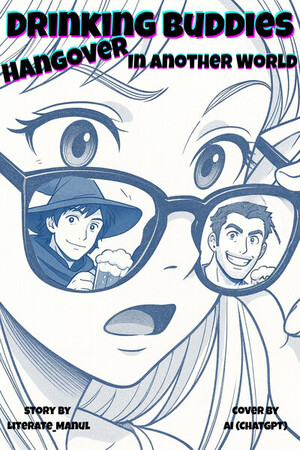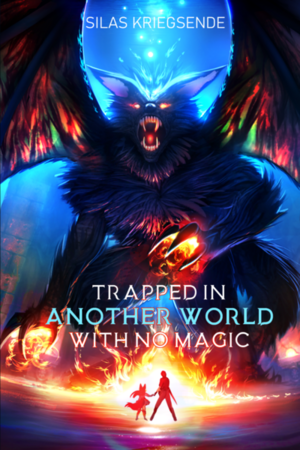Chapter 2:
The Worldly Man
The Dragon and Her Tales on the Road
A gaggle of deacons gasp in awe within the imperial chapel. Ten years of careful planning had led to this moment. A ball of light appears at the feet of the Goddess of Life. In turn, the world outside the chapel darkens in anticipation. Then, as inexplicably as it had appeared, the light vanishes to reveal a boy in an odd outfit. He wears a white dress shirt, a black necktie, and a blue blazer. His white shirt, too, is tucked into weird form-fitting pants.
The deacons kneel before the man. Their black gowns drape onto polished marble while a thin opaque veil hides their faces. There is only one amid that crowd who has their face unveiled, and that is the High Priestess.
"Welcome," she proclaims. "We welcome, indeed, the savior of our time. May we inquire of thy name?"
"Takashiro Sakurai," he says. "Where am I?"
"You are in the Empire of the Sun. We have summoned you in a time of crisis. A plague of demons encroaches upon our land from the West, and we must have your help."
"Nihon?"
"I apologize," she tilts her head. "'Nihon,' is it? That is not a word I am familiar with."
" Am I still in Japan? How am I speaking in your language?" he asks. His face increasingly wrinkles in fear.
"I am sure you will have your answers soon. A carriage awaits beyond the chapel doors. His Majesty awaits in the imperial hall."
There is little that a man can offer in productivity for a world that is not his own. This I say to myself as I watch the boy who follows the red carpet out.
His reception before His Majesty was ever the glamorous occasion - or so I overheard from His Majesty's advisors. They say the boy was timid in the hall, his vocal expressions strange, though he nonetheless scrounged the courage to answer His Majesty's questions. He had also knelt respectfully, in proper decorum. But as to his power, we could not yet know what he can offer.
About five days after the strange boy's descent, I met him by chance in the palace courtyard. He had just finished a bout of swordsman training in the barracks and so decided to stroll in the greenery for a change. Upon a closer look, I found his skin rough from the remnants of puberty. His black curly hair came oddly familiar. And his complexions resembled a race of mankind far removed from this land.
"The Empire of the Sun is like that of the comics I used to read," he chimes.
"Comics?" I ask.
"Yes. Our city streets held bookstores in which we could browse newly published books - many of which, for a time, were in the 'reincarnation' genre."
"Oh! Were your scholars learned in the science of reincarnation?"
"No, no, of course not! What am I saying? I'm sorry to make you misunderstand. These were just fictional books where boys and girls could imagine being transported to another world as a hero, much as I am now."
"I see. And have these days lined up with those stories thus far?"
"I... cannot say. The heroes in those stories fought dragons and other monsters. They enjoyed rescuing girls and rising in the ranks of adventurer guilds. The nice thing about these stories is imagining the chance to explore a new world far away from home. But all I have done is explore myself. Where is my family? What am I, here? Why did it have to be me? I feel alone. Very alone. All I have learnt in my seventeen years on Earth - gone. Who am I, now? Who am I? Who are you?"
"Did I forget to tell you my name?"
A tear rolls down his face. The reservedness he once held crumples into a frantic sob, and he yells. He screams to the sky. Five palace maids rush toward us. They attempt to calm him, but a swing of his fists knocks one of them to the ground. The guards in the area restrain him against the grass. As the boy continues to struggle, one guard bids me to calm the boy. I kneel besides the boy. A guard holds his head still and, with a finger, brushes the boy's hair aside. I plant my lips on his exposed forehead, and the boy at once falls into a deep sleep.
The emperor is a man who believes in superstition and magic. His financial advisors are cast aside in favor of what he believes more easily unites his people: legends. Thus, over ten years, his overwhelming religious faction devoted material assets toward the study of spiritual summoning. I cannot say if the emperor ever considered the fruitlessness of his endeavors. Regardless, he has repeatedly called for a gathering of sages. These were quarterly meetings of which I have been a part of.
When the boy was first summoned, these meetings bore levity of the potential of the hero. But as the years dragged on, the gravity of the boy's depressive psyche wore on the men.
"We cannot allow this to continue," says a sage at one of our meetings. "Your Majesty, you must call in a psychiatrist."
"I have, good sir. Believe me, I have. We've treated the boy with medications for depression and homesickness. But something within him refuses to get well, and we cannot pin it down. The doctors cannot tell if it is due to his foreign spirit or that he has simply given up."
"We have come so far, Your Majesty. The people last saw the boy when he was summoned. They must see the boy again."
"What's more," another sage pipes up, "word of the hero's condition has already spread to the demons. They march ever closer by the day. Time is not on our side."
"I know," says the emperor. "I know."
Is it a product of sunk cost fallacy? I wonder. The city walls are brittle and crooked. The wear of the wind is evident even at a distance. Yet, some people still hold onto hope, like the first princess and her knight. At our private gatherings with the boy, the princess, her knight, neither of the latter two would ever betray their true feelings. The boy could never help but smile weakly at their positive spirits.
At the turn of the decade, the crown prince killed his father and married the first princess. The new emperor did not inherit his father's trust in fate, let alone in magic. He also would not inherit those useless quarterly meetings. The boy nonetheless remained with his life. Upon the initial invasion at the empire's borders, he was cast out in hopes that the hero may find his way. By then, I had long departed the empire. Stories say the boy, by then in his late twenties, wandered to a remote village. There, in front of the village fountain, he slit his throat and died.




Please sign in to leave a comment.